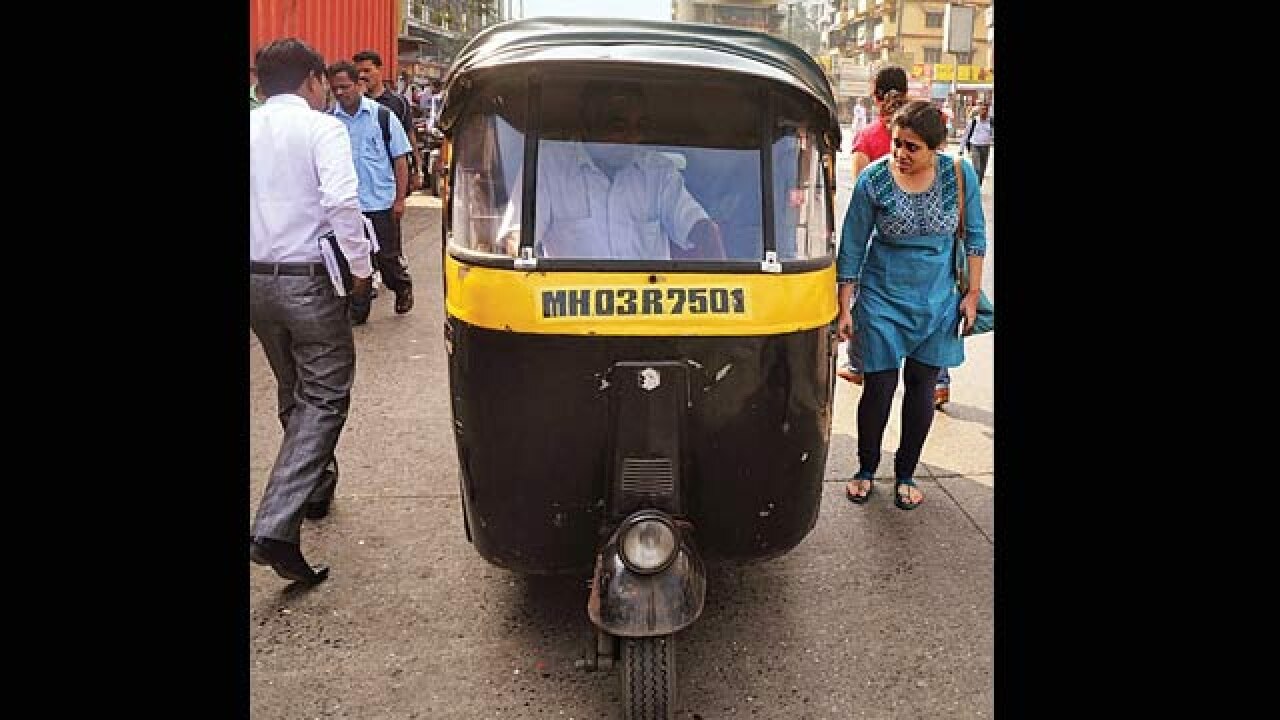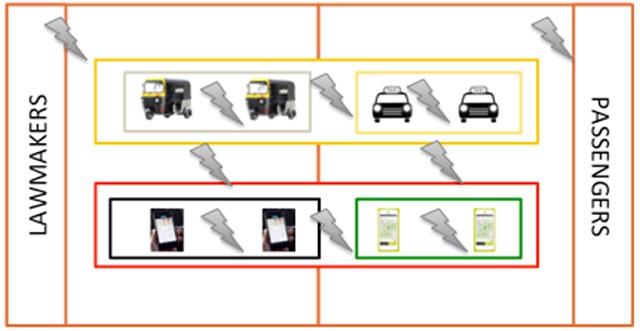
In an earlier column, Tea with your enemy, I had included a news report. Lo and behold, I came across a new item, that 250 taxi drivers had got together to offer a discount of 20%. I guess market forces took over and price was the easiest lever available. Perhaps, the solution might be beyond pricing. You might recollect the below conflict map and the potential conflagration zones indicated by the little lightning icons.

The conflagration zone between taxi drivers and passenger relationships have developed over many decades. I will stick my neck out to state that the solution is much easier than you think. It is in exactly one sentence. The sentence is that of their narrative. I will offer it a bit later.
First let's understand how these narratives develop. The search for the narrative starts with self-discovery.
From the passenger’s perspective: It’s a Monday morning. I am rushing to work. I spot an auto and pray it is empty. Then I look around to see if there is any competition in the form of other potential people who might want to steal my ride. The auto driver spots my stretched out hands flapping like a duck. He drives up and the ritual begins.
Regardless of the city or the mother tongue, I am always asked, “kahan jaana hai (where do you want to go?)”. Somehow auto drivers across the country have learned this Hindi phrase. It is also asked in a rather interrogatory manner. If my destination is unsuitable, there is a disdainful shake of the head, the driver looks away without a pause and shoots off. The ritual repeats itself, till my destination matches the driver’s preference. He then directs you, with a deliberate right-to-left tilted shake of his head to your seat. Basically, he has given you “permission” to board his vehicle and you are finally on your way.
From the driver’s perspective: It's very simple. They eat from what they earn that day. The aim is to maximise the profit from every ride. They have expenses to fulfill - run their auto, pay the rent to the owner and of course, put food on the table at the end of the day. Therefore they have to make a profit in every ride. They cannot rely on tomorrow.
Obviously, there is a conflict. The passenger needs to reach his destination. The driver needs to feed his family.
Stories feed negative spirals.
Over time, we have all had these stories to tell about each other. Relationships are stuck in an acrimonious spiral. Past narratives of passengers influence our current and future interpretation of drivers which in turn influences their behaviour. The spirals are fuelled by unkempt uniforms, unwillingness to return small change, and aggressive driving. What makes it more difficult is that we have experienced this since childhood, when we are most likely to retain the narratives about each other's communities. It has been hard-coded. Not just for taxi drivers, but also for friends, couples, communities, and indeed for nations.
Narrative and Emplotment
Aristotle’s Poetics is where emplotment is used to explain the concept of mythos. Noted French philosopher Paul Ricoeura says in his book Time and Narrative that we undertake “emplotment”, where we put together our past events and the limited information from the event to form a mental map about a community’s behaviour.
The focus here is on the past. We tend to form connections between disparate and unconnected events, because we love to see patterns of cause and effect. We form a moral universe of the events of the past and use it in the present moment. Thus creating a confirmation bias.
How do narratives spiral out of control?
With the creation of a moral universe, the human brain forms a notion of right and wrong. We seek only the information which seeks to conform with our truth.
How does it play out? When we are late for a meeting, it is just so easy to get away with, “Oh..I could not find an auto”. “No auto was willing to get me here”. The late-comer is spared, and the taxi-driver has yet another black mark against him. We become the “victim” of the driver’s arrogance and inconsiderate behaviour.
We do this everywhere. We use a narrative in relationships. My boss is an ****. My partner is inconsiderate. We use narratives to describe our experiences. We use narratives to describe our vacations. We use narratives to describe our good fortunes and bad luck. We make ourselves the victim, absolving ourselves from any wrongdoing, and our victimisation is made legitimate by those around us. Now the spiral is well and truly out of control.
Why do narratives impact us?
With the telling of each narrative, we develop a pattern of unconscious thoughts, feelings, and actions. If we are the protagonists of the story, the emotions are stronger. A very convenient script has been developed in our heads.
Psychotherapist Louis Cozolinoa describes how narratives influence all the hemispheres of our brains. When we hear stories being told, our entire brain is involved in the process. Just like when we are seeing a movie with an interesting plot. If the brain senses that the plot is familiar, we switch off. When narratives about taxi drivers are told, it is always with a great amount of garnish.
Kathleen Kennedy and Emily Pronin in their paper 'When Disagreement Gets Ugly – Perceptions Of Bias And The Escalation Of Conflict' state that “it is a truism, disagreement creates conflict”. They ask the question, why can’t we all get along? They found that “participants viewed an allegedly moderate person as more biased the more they disagreed with her”.
The person’s own position influenced the perception that the other was biased. They further state something interesting. “In disputes between leaders of nations, over issues such as whose country should control which land, each side may take the disagreement to be a sign of the other’s inability to be objective and may therefore respond by dropping bombs rather than seeking a negotiated resolution”.
It is the same with marital couples, we are confident that we are objective and the other person is irrational. When we disagree with someone, we cannot disagree and leave it alone.
Narratives influences leadership.
In our minds, we hold our own narrative to be true, rational, and moral. Think about couples that break up. For the rest of their lives, they will hold ill feelings about their exes. It is the same with the bosses we loved to hate.
Narratives can inspire a change of perception. Leaders who are great storytellers can direct large groups towards common goals with authenticity and purpose.
I would urge the drivers to take a step back and think about how they can change the narrative. Like I said, it is in one sentence. One driver at a time, one passenger at a time, one ride at a time, the narrative can be retold.
Changing your script
When we spot an auto, our heart rates begins to rise. We know that there is a good chance that the auto-driver might decline to take us to our destination. As the auto screeches to a halt, our minds are in fight mode. This uncertainty feeds the negative narrative. Sometimes we are rewarded and sometimes we are left stranded. The narrative spiral continues its descent.
If we try and change the narrative, we are seen as being silly. But let me try.
If you have ever been in a Mumbai auto, they have a very interesting value system. If your fare is Rs 19, and you give them Rs 20, they will always return Re 1, no questions asked. On the other hand, if the fare is Rs 21, they are almost always willing to waive off the Re 1. I always derive a great thrill, watching the driver confidently reach for his little coin purse to return the rupee coin. Sometimes I accept it, sometimes I wave his hand away, say a thank-you and stride away. This little value system made me value them as responsible members of our community.
Paul Ricoeur calls this as active interpretation, when someone scripts their own narrative. The brain is plastic, flexible and easy to change. If we challenge our brains enough, they are more than willing to accommodate a new truth.
First, Mi casa et su casa.
It is Spanish for, my house is your house. That is the narrative that I suggest. When an auto driver sees a potential rider they should still scamper towards them and then change the way they ask for the destination. They should first wave the passenger into the seat. In true terms, Mi casa et su casa. Then confidently ask, “Madam, kahan le jayen aapko”. (Madam, where would you wish to be dropped). As if there is no place on this planet, you would not ferry your customer.
All it needs is one brave auto-driver to change the script of kahan jaana hai to kahan le jayen? There is a huge possibility of abundance between the two phrases.
If we spot an auto or a taxi, our minds should not even need of the ritual of asking for permission. With this one sentence and behavioural change, an auto driver can become a symbol of reliability, hospitality and purposefulness.
Second, Learn from the enemy
Just like a grocery store, every fare might not be profitable. Uber drivers score in their willingness to take the risk of an unprofitable passenger. It is driving the adoption of taxi-hailing apps. Each driver is willing to “take one for the team”. They are happy to absorb a small short-term loss to protect the sanctity of the reliability of the entire community. Each driver contributes to the narrative. In the last couple of years, they have seen a payback.
Third; change the script, change the landscape
Imagine the possibility, if with this one sentence, just one additional percent of the city’s population took to autos and taxis. I reckon we will have to double the taxi and auto fleet in the city. The landscape might change.
Bringing narratives into our lives
To conclude, it is not about taxi drivers. Think about our own narratives. Narratives are truly positively infectious. Do we narrate a tragedy or a life of purpose, strengths, and values? Do our narratives energise us? Do they energise others?
Changing the narrative will lead to lesser exits and more pacts. Changing the narrative will heal instead of bias. Changing the narrative will be more about treatise instead of separatism. Changing the narrative might catalyse positive deviance to positive leadership to positive change at work, home, and our communities.
The author is the Founder of The Positivity Company, where he helps business leaders become more positive and productive.